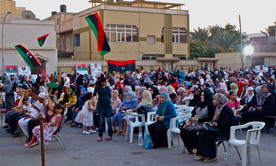 TRIPOLI – International News – In Tripoli you’re never far from a celebration. There is no sign yet that the novelty of their newfound freedom is wearing off for residents of Libya’s capital.
TRIPOLI – International News – In Tripoli you’re never far from a celebration. There is no sign yet that the novelty of their newfound freedom is wearing off for residents of Libya’s capital.
Nearly three weeks after the takeover of the city from Qadhafi forces, you don’t have to go far in the evening to find people still singing and dancing whilst draped in the ever-present red, green and black stripes of the revolution.
The restaurant and café culture may not yet be restored to the level Tripoli is used to, but as sporadic shipments of fresh produce come in, restaurants improvise their menu and word quickly spreads of an open eatery.
“The shops are opening, it is getting more calm, getting more safety, it’s getting better I think,” says a woman in Tripoli’s main square. But her friend confides, “It is kind of dangerous though, I mean, like wherever you go you see these guys with guns everywhere.”
Disarmament is clearly an issue and the fractured security structure of the different brigades of the National Transitional Council (NTC) offers plenty of opportunities for the progress to be reversed. Restoring the police service is top of the agenda for Tripoli’s hastily assembled council.
Keeping the lights on
One key aspect that will speed up the process of getting life back to normal is how quickly electricity and water service has been restored. NATO’s approach of not targeting infrastructure has paid dividends here.
There is still, of course, much to do to get the city back to normal. Garbage collection is an issue as most of the workers were foreign and have now fled. Some fear returning whilst others have already taken the opportunity to get back to work. Other foreigners came to Libya from neighbouring Arab states and sub-Saharan Africa to earn a living doing the menial jobs that Libyans don’t want.
Inside the forbidden compound
Tripoli’s residents have also been taking the opportunity to indulge their curiosity.
The sprawling Qadhafi compound in the centre of the city is the newest tourist attraction. Now a battered shadow of its previous gaudy opulence, the building once inspired fear in ordinary civilians.
“People are very excited to discover what’s behind these walls” says Majdeh, visiting for the first time. “It was prohibited to stop outside these walls, and now people are excited to discover how Qadhafi lived, how he ruled us, and how he controlled Libya from one place,” he says.
Known as “the house of the devil” under the Qadhafi regime, showing an interest in this building was highly inadvisable. “Every Libyan, even if he gets too close to the gate, or if he slows down beside the gate, the guards raise their guns on him,” says Anwer. “Being here and rising up our flag, our Libya free flag, it’s been a victory.”
Unfinished business
NATO’s mission to protect civilians remains in place as the conflict continues with pockets of the former regime. The speed with which the NTC is able to deal with the remaining forces loyal to Qadhafi will govern their ability to focus on returning Libya to normalcy.
Tripoli’s residents know the extent of the work still to do before the situation can truly be called “normal”, but they also seem to have the patience to wait for it to happen.
“We are very happy now with the life is becoming normal”, says Tahir a worker at Tripoli’s airport. “Of course it will become gradually, not really quickly, gradually, and we will accept that.”
[ad#Google Adsense 350×250 sidebaradd]






